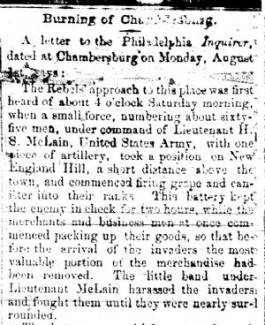Collection Name
About
Burning of Chambersburg
A letter to the Philadelphia Inquirer dated at Chambersburg on Monday, August 1 says:
The Rebels approach to this place was first heard of about 4 o'clock Saturday morning, when a small force, numbering about sixty five men, under command of Lieutenant H.S. McLain, United States Army, with one piece of artillery, took a position on New England Hill, a short distance above the town, and commenced firing grape and canister into their ranks. This battery kept the enemy in check for two hours while the merchants and business men at once commenced packing up their goods, so that before the arrival of the invaders the most valuable portion of the merchandise had been removed. The little band under Lieutenant McLain harassed the invaders and fought them until they were nearly surrounded.
The battery was withdrawn, and at 6 o’clock the raiders came into town in scattering squads, under that ferocious and unrelenting freebooter, McCausland. Formal possession of the town was taken, and Gen. McCausland made his headquarters in the Franklin house. After this he made a proclamation to the citizens, demanding one hundred thousand dollars in gold, or five hundred thousand dollars in greenbacks.— He threatened to burn the town if the money was not obtained This demand, of course, was not complied with. The Rebel General was evidently aware that the money could not be raised; and he was sure of it affording a pretext to execute the premeditated plan for destroying Chambersburg.
McCausland then allowed his men to scatter in squads over the town, to plunder and ravage the people, and put the torch to whatever buildings they thought proper to burn. Their first move was for the taverns in the town, and here they drank to excess and then visited private residences, and demanded of the occupants certain sums of money, threatening to lay their dwellings in ashes. Some of the citizens saved their residences by complying with their terms: others gave them to understand that they would suffer death rather than give them money. A guard of a half a dozen men had been detailed by the Rebel General to visit the resident of Col. Alexander K McClure, situated about a mile and a half out of town. They did not know the direct locality of Mr. McClure’s residence, and while proceeding on their errand they stopped at the house of Mr. Wm. Eyster, and that gentleman being at home, they inquired of him where the property was located.
Having received a reply, they visited the splendid residence, ordered Mrs. McClure, who was very sick at the time, out of the house, stole everything that was of value, and burned the house. They next proceeded to the barn, which was well filled with wheat, and this structure shared the same fate. They were not aware that Mr. McClure had several other building and barns in the immediate neighborhood, or they would surely have been destroyed. Mrs. McClure, although sick, was obliged to walk nearly eleven miles. The Colonel had left the place before the Rebels entered, and had gone to Harrisburg. His loss will not fall short of £50,000.
The Government Commissary store house, the Court House, three printing offices, one belonging to the German Reformed Church, where the German Reformed Messenger and a German paper were printed; the office of the Franklin Repository, and the office of the Valley Spirit; all hotels, grocery stores, and the principal portion of the town was, a few hours after they commenced their hellish work, one mass of ruins. In all, there have been about two hundred and fifty buildings destroyed. At the time of the fire, a strong breeze was prevailing and the flames spread in every direction.
It was really heart rending to see the women, almost frantic, running to and fro, begging the miserable wretches to cease the work of destruction. Children were running in every direction seeking for their parents, while the women were crying and hunting for their children who could not be found. Families were rushing from their homes, without anything that they could call their own; except the clothing they had upon their backs, to seek security in the desolated fields around the town. The appeals of the old and helpless were heard above the noise of the conflagration, and this only served to elicit the scorn and derision of the freebooters, who came for the infamous purpose of laying this once beautiful town in ruins.
